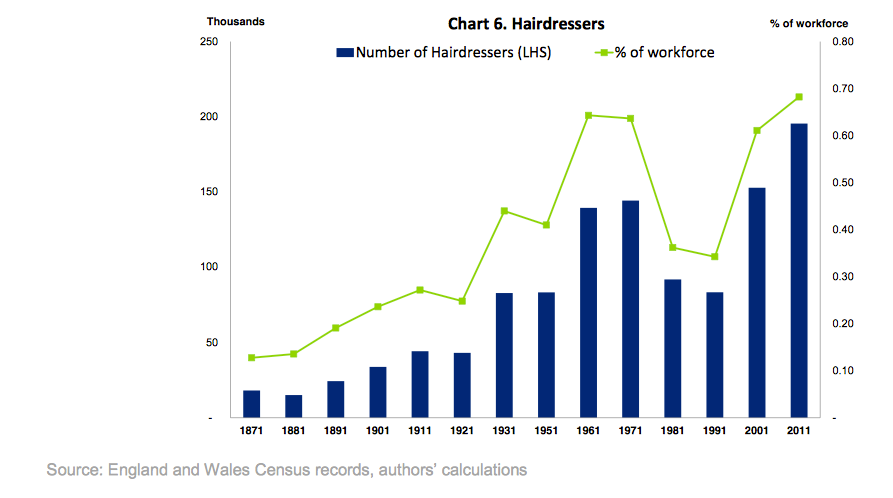Are robots really coming for your job?


Get involved with our crowdsourced digital platform to deliver impact at scale
Stay up to date:
Economic Progress
A new Deloitte report casts doubt on warnings that the inexorable march of new technology will lead to mass unemployment.
According to the authors, the truth is quite the reverse. Ian Stewart, Debapratim De and Alex Cole argue that technological change has prompted the decline of a number of routine jobs but has allowed for huge growth in cognitive, non-routine employment and hard-to-replicate manual jobs.
Brief lessons from history
Probably the most common example of the impact of technological change on employment is the shift from an agrarian society towards an industrial one. Here it’s the sheer scale of the transition that is impressive.
Between 1871 to today the total number of agricultural workers has declined by 95% as new machinery and tools replaced the need for labour, falling from 6.6% of the workforce to 0.2% in 2015.
But the rise of new technology didn’t only impact rural life. The early stages of urbanization were equally marked by a huge influx of former agricultural workers into innercity factories that required significant labour resource to churn out the consumer goods of the age.
As the authors note, in just over 60 years “employment in manufacturing has fallen from 38% of the workforce in 1948 to 8% in 2012”.
The productivity gains provided by new technology meant that factories and farms could produce more than ever before at a lower cost. This, in turn, fed through to the prices of those goods lowering people’s cost of living and in many cases sparing them arduous and dangerous jobs that could result in debilitating injuries and even death.
So what about those job gains?
Well, as the cost of goods came down, along with the labour resources required to produce them, people had more money to spend on things other than necessities and more leisure time to develop more complex, cognitively challenging industries.
The authors write:
Demand for specialist services such as medicine, business and professional services, marketing, design and education have increased as incomes have risen. These sectors help customers benefit from improvements in specialist knowledge and assist them in navigating complexity.
This process meant that, while jobs were being destroyed in traditional sectors, they were being created at an ever faster pace elsewhere. See, for instance, the growth in the number of accountants over the past 150 years:
The same trends can be seen in finance, medicine, education, media and countless other professions. These industries helped to increase life expectancy, spread information and learning, and open up global trade in ways that have enriched societies and improved living standards for billions of people worldwide.
In doing so, it has also allowed the growing middle class to spend more on leisure pursuits and jobs that involve person-to-person interaction. Other sectors that have seen significant employment gains include bartenders, hairdressers and carers.
Are the robots still coming for our jobs?
The short answer is, probably. And indeed, hopefully.
If history is any guide, robots replacing people in the workplace should provide yet another boost to productivity and enrich rather than impoverish society as a whole. Indeed, given the stagnation of productivity growth in developed markets since the financial crisis and decades of underinvestment, the rise of the robots possibly represents a best-case scenario.
The real fear, in this analysis, is that the majority of the gains from technology have already been exhausted and we are now set for a period of sluggish improvements in productivity and living standards.
That does not, however, mean there are no reasons to worry. Transitions are always painful for those who find their professions or crafts rendered redundant by new technology. The growth of new jobs, especially specialist professions, can require extensive (re)training and as such can often skip a generation in providing widespread benefits.
Moreover, there is no guarantee that the past is a good guide for the future. If the rise of automation pushes people to compete with machines, rather than opening up new opportunities it could further erode worker bargaining power and hold wages lower down the income spectrum.
That a dystopian future is possible, however, should simply be a prompt for people to not simply assume the beneficial (or benign) nature of technological progress. Instead, as the Deloitte paper suggests, when harnessed effectively it can provide substantial gains for societies as well as providing solutions to meet some of our most pressing global challenges, such as poverty, climate change and scarcity of basic necessities.
Have you read?
Could a robot do your job?
Can we build computers with empathy?
The robots helping with healthcare
Author: Tomas Hirst is editorial director and co-founder of Pieria magazine and was previously commissioning editor, digital content at the World Economic Forum.
Image: A technician makes adjustments to the “Inmoov” robot from Russia during the “Robot Ball” scientific exhibition in Moscow May 17, 2014. Picture taken May 17, 2014. REUTERS/Sergei Karpukhin
Don't miss any update on this topic
Create a free account and access your personalized content collection with our latest publications and analyses.
License and Republishing
World Economic Forum articles may be republished in accordance with the Creative Commons Attribution-NonCommercial-NoDerivatives 4.0 International Public License, and in accordance with our Terms of Use.
The views expressed in this article are those of the author alone and not the World Economic Forum.
Related topics:
The Agenda Weekly
A weekly update of the most important issues driving the global agenda
You can unsubscribe at any time using the link in our emails. For more details, review our privacy policy.
More on Economic ProgressSee all
Joe Myers
April 12, 2024
Joe Myers
April 5, 2024
Pooja Chhabria
March 28, 2024
Kate Whiting
March 28, 2024
Joe Myers
March 28, 2024
Andrea Willige
March 27, 2024









